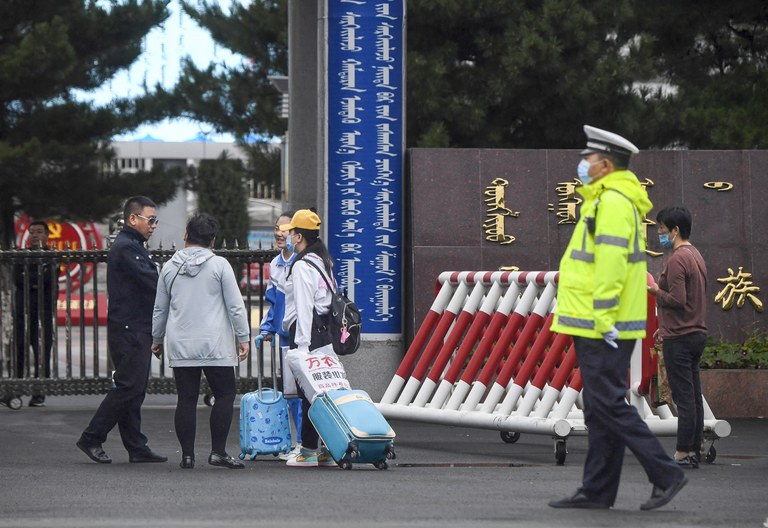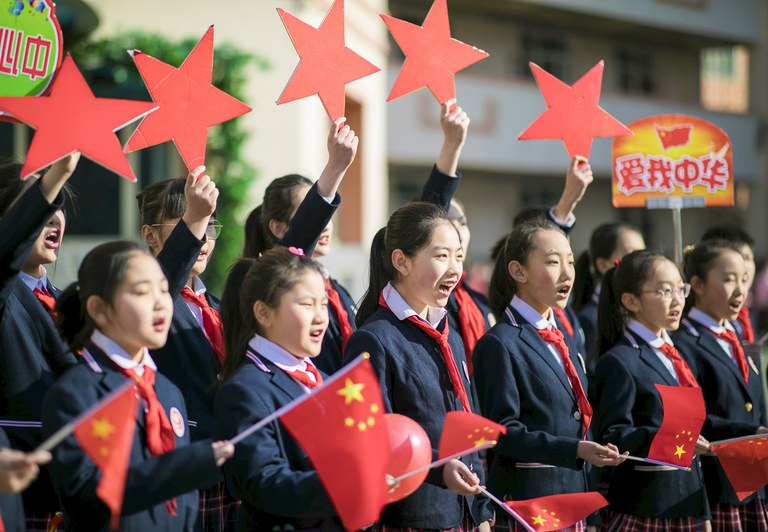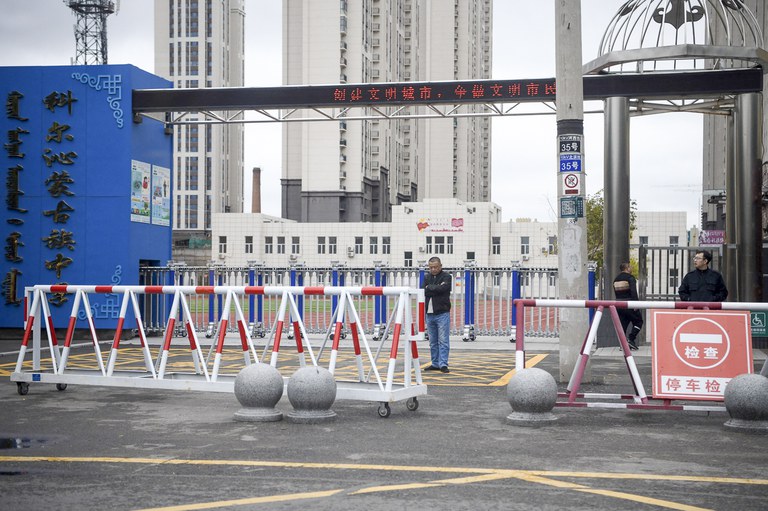| Radio Free Asia |
| May 6, 2024 |
| By Qian Lang for RFA Mandarin |
|
|
|
|
Mongolians protest against China's plan to introduce Mandarin-only classes at schools in the Chinese province of Inner Mongolia, at Sukhbaatar Square in Ulaanbaatar, the capital of Mongolia on September 15, 2020. (Byambasuren Byamba-ochir AFP) |
The move comes as schools phase out instruction in the Mongolian language.
Chinese authorities in the northern part of Inner Mongolia are hiring teachers from across China, offering attractive packages to encourage fresh graduates who are native Mandarin speakers to settle in the region, according to recent recruitment notices.
The move appears to be part of a nationwide move to eradicate the use of Mongolian in primary and secondary education, overseas activists said.
Primary and secondary schools across the region were ordered to end Mongolian-medium instruction and to offer only Chinese-medium teaching from Sept. 1, 2023.
Authorities in Otog Front Banner, a county-like administrative division outside Ordos city, are looking to recruit 40 high-school teachers of Chinese, math, science, English as well teachers of history, geography and "ideology and politics," according to a recruitment ad dated April 25 posted to the Gaoxiaojob.com jobs board.
They are also looking for 30 primary school teachers, nine to teach Chinese, with other vacancies available for teachers of math, English, science and other subjects, the notice said.
It added that successful applicants from top-tier universities can expect to receive a "resettlement allowance,” with accommodation provided. Applicants must be under 30 years of age, according to the ad.
 |
|
| Policemen stand on guard outside a school in Tongliao, in Chinaís northern Inner Mongolia region on September 10, 2020, where there have been recent protests about a new bilingual education policy by the Chinese government. (Noel Celis/AFP) |
Similar advertisements have also been posted by authorities looking for 70 primary and secondary teachers to fill posts in Ordos city, and 20 people to teach preschool in Shilingol Banner, near the border with the independent country of Mongolia.
The recruitment drive comes as Inner Mongolia Vice Gov. Bao Xianhua called in a signed opinion article in the ruling Chinese Communist Party's official mouthpiece, the People's Daily, for "a team of teachers with excellent skills, providing a strong guarantee for the building of a strong regional education system, who will write the next chapter of the modernization of Inner Mongolia, Chinese-style."
Phasing out Mongolian
Activists said the move is part of the government's bid to erase Mongolian language and culture from the region's schools.
It comes as schools complete the phasing out of Mongolian in favor of Mandarin as a medium of instruction for non-language classes including history, math and science — a policy that sparked mass protests by parents and students followed by a regionwide crackdown when it was announced in September 2020.
 |
|
| Students hold Chinese flags and cutouts of red stars as they perform a song titled "Me and my country,” at a ceremony marking the primary school's new semester in Hohhot, Inner Mongolia Autonomous Region, China Feb. 28, 2019. (Stringer/Reuters) |
An ethnic Mongolian teacher from Shilingol League who gave only one name, Tana, said that ethnic Mongolian teachers in the region's primary and secondary have been left out in the cold by the switch to Mandarin across the board, and are struggling with delivering class in their second language.
"It's a bit easier in primary schools, but junior high school teachers who used to teach in Mongolian are suddenly having to teach in Mandarin," Tana said. "This generation of teachers finds it very hard to teach certain subjects now that they suddenly have to teach in Chinese."
Tana said her school had informed teachers who are unable to make the transition to Mandarin would need to retire early or be redeployed in the pastoral team.
"They called a meeting of ethnic Mongolian teachers and said that either we have to teach in Chinese, or take jobs in the dormitories or the canteen," she said.
Nearly impossible expectation
Ordos-born Yang Haiying, a professor at Japan's Shizuoka University who has written a history of the "genocide" of ethnic Mongolians during the political violence of the Chinese Communist Party's 1966-76 Cultural Revolution, said it's almost impossible for many native speakers of Mongolian to suddenly switch to teaching their subjects in Mandarin.
"They are expected to teach chemistry in Chinese. Equations, physics, theory, etc.," he said. "This is tantamount to forced layoffs, because [the government] knows very well that the ethnic Mongolians won't be able to do this."
The fact that authorities in the region are recruiting heavily for the next academic year suggests that many ethnic Mongolians have either left, or are on their way out of, the workforce.
"They're recruiting from the rest of China for young people to bring their families, which is a disguised settlement program," Yang said.
Japan-based ethnic Mongolian activist Haas, who goes by a single name, said the aim is to marginalize ethnic Mongolians, who were trained in their native language to teach in that language.
 |
|
| Plainclothes policemen stand in front of the Horqin Mongolian School in Tongliao in China's northern Inner Mongolia region, following recent protests over a new bilingual education policy by the Chinese government, September 10, 2020. (Noel Celis/AFP) |
"The Chinese Communist Party's policy is not to allow them to stay on [in their posts]," Haas said. "They want to separate them from mainstream society, because the authorities fear they will obstruct the policy when it comes to be implemented."
"So they're trying to kick all of the ethnic Mongolian teachers out."
‘Colonial policy’
Authorities began merging Chinese-medium and Mongolian-medium schools across the region, forcing around 1 million ethnic Mongolian children from rural areas into more than 2,000 boarding schools, according to a Feb. 21, 2024, report by the head of the New York-based Southern Mongolia Human Rights and Information Center, Enghebatu Togochog.
"[The] boarding school system ... is an integral part of China’s overall colonial policy of wiping out the language, culture and identity of the entire Southern Mongolian population as a whole," the report said, adding that it had gone hand-in-hand with government policies aimed at ending Mongolian herders' nomadic way of life.
"Now the Chinese government is targeting the Southern Mongolians’ last defense of national identity that is the language," Enghebatu Togochog wrote. "From kindergartners to college students, from teachers to professors, from ordinary herders to party members, the entire [ethnic] Mongolian population is subjected to [a] massive training program."
During the "training" sessions, ethnic Mongolians are condemned for expressing their ethnic identity, for singing Mongolian songs and wearing Mongolian clothes, as well as for not having enough Han Chinese friends or being nice to Chinese people, he said.
Instead, they are expected to embrace Han Chinese language, culture and traditions.
Translated by Luisetta Mudie. Edited by Malcolm Foster.
Source: https://www.rfa.org/english/news/china/mongolian-schools-mandarin-teachers-05062024144935.html






 Beyond
Great Walls: Environment, Identity, and Development on the Chinese
Grasslands of Inner Mongolia
Beyond
Great Walls: Environment, Identity, and Development on the Chinese
Grasslands of Inner Mongolia China's
Pastoral Region: Sheep and Wool, Minority Nationalities, Rangeland
Degradation and Sustainable Development
China's
Pastoral Region: Sheep and Wool, Minority Nationalities, Rangeland
Degradation and Sustainable Development The
Ordos Plateau of China: An Endangered Environment (Unu Studies on
Critical Environmental Regions)
The
Ordos Plateau of China: An Endangered Environment (Unu Studies on
Critical Environmental Regions)